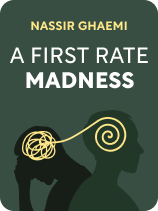

This article is an excerpt from the Shortform book guide to "A First Rate Madness" by Nassir Ghaemi. Shortform has the world's best summaries and analyses of books you should be reading.
Like this article? Sign up for a free trial here.
How does mental health affect work performance? How have bad mental health treatments destroyed well-known leaders?
Both good and bad mental health affect work performance. For most, it’s important to be in a healthy state of mind when working. However, some leaders actually benefit from poor mental health, especially during crisis situations.
Learn why A First-Rate Madness by Nassir Ghaemi says you need to check in on your mental health as a leader.
Good Mental Health Is Bad During Crises
How does mental health affect work performance? According to Ghaemi, mentally healthy leaders often make bad decisions during crises—they tend to be overly optimistic, less empathetic, unchallenged by struggles, and inflexible when compared to mentally ill leaders. He argues that while such leaders can be effective during peacetime, they often lack the right instincts during times of conflict. To make his point, he examines how mental health negatively affected the leadership of Neville Chamberlain, George McClellan, George W. Bush, and Tony Blair.
Ghaemi argues that the reason Neville Chamberlain, the prime minister preceding Winston Churchill, was unable to accurately assess the threat Hitler posed to the world was that Chamberlain was too mentally stable. Unlike Churchill, Chamberlain took a more conciliatory approach to the Nazi threat. Ghaemi argues that Chamberlain’s mental health prevented him from understanding the reality of the situation—that appeasement wouldn’t be an effective solution. Instead, the Prime Minister was overly optimistic, dismissed the German dictator’s belligerent intentions, and believed that war could be avoided through negotiation.
Similarly, Ghaemi argues that the sound mental health of General George B. McClellan, another Union commander during the Civil War, contributed to his military failures. Unlike with General Sherman, Ghaemi found no evidence that General McClellan suffered from any mental illnesses, and this prevented him from having bold, creative insights. McClellan consistently misjudged his enemies and limited himself to the traditional strategies he’d learned at West Point. His good mental health limited his ability to think outside the box and made him inflexible.
Finally, Ghaemi examines the leadership of George W. Bush and Tony Blair during the September 11 attacks in 2001, arguing that neither leader possessed the understanding or flexibility to properly handle the situation. Based on a review of their pasts, Ghaemi determines both Bush and Blair to be mentally healthy. He argues that both failed to approach the conflict with a nuanced perspective and decided to use military power to invade Iraq, a controversial decision that many have criticized.

———End of Preview———
Like what you just read? Read the rest of the world's best book summary and analysis of Nassir Ghaemi's "A First Rate Madness" at Shortform.
Here's what you'll find in our full A First Rate Madness summary:
- How mental illness can make someone a better leader
- How leaders like Churchill and Roosevelt benefited from mental illness
- The pitfalls of being a mentally well leader during a time of crisis






